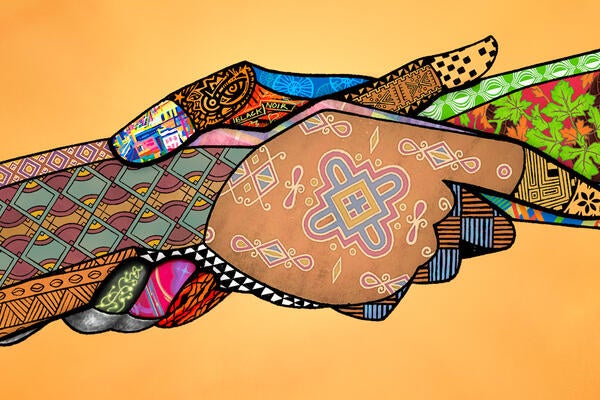
Statement on Buffalo murders
To anyone in our community affected by this senseless tragedy, please know we are here to support you

To anyone in our community affected by this senseless tragedy, please know we are here to support you
By Vivek Goel President and Vice-ChancellorThis weekend many of us will have watched and read the news from Buffalo of another devastating mass murder motivated by racial hatred and an ideology of white supremacy.
To anyone in our community that is affected by this senseless tragedy, please know we are here to support you, and we have resources you can draw on to help you cope.
Events like these force us all to confront the horrible reality of gun violence in the United States, but most importantly the reality that racialized people, particularly Black people, face every day.
Black people in the City of Good Neighbours are still heavily segregated and face systemic anti-Black racism that continues to leave them with no easy access to basic life necessities like groceries. We clearly see exactly how damaging the false narratives shared by some mainstream media and politicians of white replacement can be.
It is easy to believe that these are problems are specific to the United States. However, here in Canada, hate-motivated crime is also on the rise. New data from Statistics Canada show the number of hate crimes reported to police across the country went up 37 per cent in the first year of the COVID-19 pandemic compared with the previous year. Reported crimes targeting Black people went up 92 per cent.
The lesson from this news is, as always, that we need our societies to change. We need to grow tolerance and respect and dismantle the systems of oppression that marginalize Black people, other People of Colour and Indigenous communities. For us that starts at home. And it starts with basic questions like: can Black people in our community feel sure that they are protected from physical, emotional, and psychological violence here?
Racism exists here in Waterloo and we must continue to take action. This week at Senate and at a President’s Forum, we will be talking about the President’s Anti-racism Taskforce and their recommendations to create change at the University of Waterloo. I encourage you to join the forum to learn more about what we are doing to change the University to be a more inclusive, anti-racist place.
Taking action against racism of all forms, decolonizing and creating a safe world for Black people is not something, though, we will easily achieve with a report, a forum or a series of recommendations. It will take each and every one of us taking concrete and specific actions in our day-to-day lives to confront and challenge racist actions, policies and ideas.
I know this is an enormous challenge, but I am confident that this community can continue its efforts to make Waterloo, and the world, a place where everyone belongs.
Resources
UWaterloo Anti-Racism resource page
Counselling Services - 519-888-4567 ext. 32655
Here 24/7 - 1-844-437-3247
Health Services - Student Medical Clinic - 519-888-4096
Grand River Hospital - 519-749-4300
St. Mary's Hospital - 519-744-3311
Good2Talk - 1-866-925-5454
Crisis Services Canada - 1-833-456-4566 or by text 45645
Mates - mates@wusa.ca
The University’s Employee Assistance Program offers short-term, confidential counselling that includes face-to-face (flexible hours), telephone or online sessions for a variety of reasons. Services for students are available through Student Care.

Read more
A message from the President and Vice-Chancellor

Read more
A message from the President and Vice-Chancellor

Read more
As we prepare to celebrate Fall 2025 convocation this week, I would like to extend my heartfelt congratulations to our class of 2025.
The University of Waterloo acknowledges that much of our work takes place on the traditional territory of the Neutral, Anishinaabeg, and Haudenosaunee peoples. Our main campus is situated on the Haldimand Tract, the land granted to the Six Nations that includes six miles on each side of the Grand River. Our active work toward reconciliation takes place across our campuses through research, learning, teaching, and community building, and is co-ordinated within the Office of Indigenous Relations.